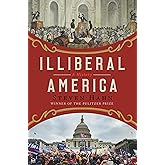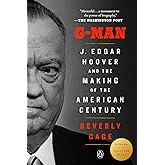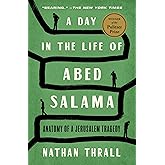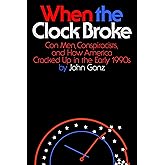
Amazon Prime Free Trial
FREE Delivery is available to Prime members. To join, select "Try Amazon Prime and start saving today with FREE Delivery" below the Add to Cart button and confirm your Prime free trial.
Amazon Prime members enjoy:- Cardmembers earn 5% Back at Amazon.com with a Prime Credit Card.
- Unlimited FREE Prime delivery
- Streaming of thousands of movies and TV shows with limited ads on Prime Video.
- A Kindle book to borrow for free each month - with no due dates
- Listen to over 2 million songs and hundreds of playlists
Important: Your credit card will NOT be charged when you start your free trial or if you cancel during the trial period. If you're happy with Amazon Prime, do nothing. At the end of the free trial, your membership will automatically upgrade to a monthly membership.
Buy new:
-29% $24.90$24.90
Ships from: Amazon Sold by: SBH_STORE
Save with Used - Very Good
$15.56$15.56
Ships from: Amazon Sold by: Aspen Book Co.

Download the free Kindle app and start reading Kindle books instantly on your smartphone, tablet, or computer - no Kindle device required.
Read instantly on your browser with Kindle for Web.
Using your mobile phone camera - scan the code below and download the Kindle app.



 Audible sample
Audible sample Follow the author
OK
Freedom’s Dominion (Winner of the Pulitzer Prize): A Saga of White Resistance to Federal Power Hardcover – November 22, 2022

Explore your book, then jump right back to where you left off with Page Flip.
View high quality images that let you zoom in to take a closer look.
Enjoy features only possible in digital – start reading right away, carry your library with you, adjust the font, create shareable notes and highlights, and more.
Discover additional details about the events, people, and places in your book, with Wikipedia integration.
Purchase options and add-ons
An "important, deeply affecting—and regrettably relevant" (New York Times) chronicle of a sinister idea of freedom: white Americans’ freedom to oppress others and their fight against the government that got in their way.
American freedom is typically associated with the fight of the oppressed for a better world. But for centuries, whenever the federal government intervened on behalf of nonwhite people, many white Americans fought back in the name of freedom—their freedom to dominate others.
In Freedom’s Dominion, historian Jefferson Cowie traces this complex saga by focusing on a quintessentially American place: Barbour County, Alabama, the ancestral home of political firebrand George Wallace. In a land shaped by settler colonialism and chattel slavery, white people weaponized freedom to seize Native lands, champion secession, overthrow Reconstruction, question the New Deal, and fight against the civil rights movement. A riveting history of the long-running clash between white people and federal authority, this book radically shifts our understanding of what freedom means in America.
- Print length512 pages
- LanguageEnglish
- PublisherBasic Books
- Publication dateNovember 22, 2022
- Dimensions6.4 x 1.9 x 9.6 inches
- ISBN-101541672801
- ISBN-13978-1541672802
Book recommendations, author interviews, editors' picks, and more. Read it now.
Frequently bought together

Customers who viewed this item also viewed
From the Publisher







Editorial Reviews
Review
“Important, deeply affecting—and regrettably relevant… essential reading for anyone who hopes to understand the unholy union, more than 200 years strong, between racism and the rabid loathing of government…White men did all this in Barbour County, by design and without relent, and Cowie’s account of their acts is unsparing. His narrative is immersive; his characters are vividly rendered.” ―New York Times Book Review
“Outstanding and urgent...a remarkable achievement.” ―New Republic
“A gem...Synthesizing brilliant research in fluent prose, and writing with an indignation that’s all the more damning for being understated.” ―George Packer, Atlantic
"A convincing case."―Eric Foner, London Review of Books
“A great read informed by mountains of research.”―CHOICE Connect
“[G]ripping and haunting…Cowie’s meticulous accumulation of detail and candid assessments…make for distressing yet essential reading. This is history at its most vital.”―Publishers Weekly (starred review)
“A powerful history showing that White supremacist ideas of freedom are deeply embedded in American politics.” ―Kirkus
"Jefferson Cowie has a knack for publishing instant classics: books that change historians' conversations. This is his most extraordinary yet. With eloquence and with brilliance, he delves deep into the annals of a specific place, Barbour County, Alabama, in order to excavate the foundations of America's darkest and most enduring story: how 'freedom' became a national alibi for cruelty, inequity, and reaction. As soon as I finished reading it, I wanted to start over and absorb it all over again."
―Rick Perlstein, author of Reaganland
“Jefferson Cowie has given us a deep history of the long war on the federal government—especially when it came to policies advancing class and race equality, of the evolution of White grievance politics, and of a new way of thinking about the psychic structure of American Exceptionalism. With eloquent, precise prose, Cowie clears away the cobwebs to reveal a national malady long in the making.”―Greg Grandin, Pulitzer Prize-winning author of The End of the Myth
“A fascinating book, Freedom’s Dominion takes us to the states’-rights stronghold of Barbour County, Alabama. Barbour was the birthplace of Governor George Wallace, whose infamous defense of segregation described integration as tyranny, segregation as freedom, and equal access to the ballot as a threat to individual rights. Wallace’s views illustrate the confounding interdependence of ideas about freedom and oppression in American politics—as does Barbour County’s long history of state-building rooted in antiblack violence, white supremacist rule, and Indian land dispossession. Freedom’s Dominion offers a searing account of that history that leaves one wondering whether American freedom can ever be disentangled from the causes it has supported.”―Mia Bay, author of Traveling Black
“Jefferson Cowie’s Freedom’s Dominion is a magisterial narrative history of white grievance politics. Cowie reveals the origins of these often hypocritical and confounding perspectives, in which those who stole, enslaved, and segregated would themselves claim to be victims of federal overreach, even as they oppressed so many others. Cowie’s terrific book explains the Southern roots of that racialized ideology and reveals how one of the most influential segregationist rhetoricians of the 1960s helped repackage this powerful form of regional white identity politics for the rest of the nation.”
―William Sturkey, author of Hattiesburg
“Freedom’s Dominion covers centuries of American history in Eufaula, Alabama, from the violence of settler colonialism through the ascent of arch-segregationist George Wallace, the region’s most famous native son. Jefferson Cowie is interested in how people in power—almost always white men—used claims of freedom to dominate and enslave others, and how they articulated domination as resistance to a tyrannical federal government. This history has urgent implications for how we understand white supremacist and anti-government politics today.”
―Kathleen Belew, author of Bring the War Home
About the Author
Product details
- Publisher : Basic Books; First Edition (November 22, 2022)
- Language : English
- Hardcover : 512 pages
- ISBN-10 : 1541672801
- ISBN-13 : 978-1541672802
- Item Weight : 1.6 pounds
- Dimensions : 6.4 x 1.9 x 9.6 inches
- Best Sellers Rank: #459,233 in Books (See Top 100 in Books)
- #645 in Civil Rights & Liberties (Books)
- #830 in Black & African American History (Books)
- #6,725 in U.S. State & Local History
- Customer Reviews:
About the author

Jefferson Cowie holds James G. Stahlman Chair in American history at Vanderbilt University. His most recent book is The Great Exception: The New Deal and the Limits of American Politics (Princeton, 2016). He is also the author of Stayin' Alive: The 1970s and the Last Days of the Working Class (The New Press, 2010), which received the Francis Parkman Prize, the Merle Curti Award, and was a finalist for the Anthony Lukas Award for nonfiction, in addition to winning several other national prizes. He is also the author of Capital Moves: RCA's Seventy-Year Quest for Cheap Labor (The New Press, 2001), which received the Philip Taft Prize for the Best Book in Labor History for 2000. He is also the co-editor of Beyond the Ruins: The Meanings of Deindustrialization (Cornell University Press). He lives with his family in Ithaca, New York.
More at: www.jeffersoncowie.info
Customer reviews
Customer Reviews, including Product Star Ratings help customers to learn more about the product and decide whether it is the right product for them.
To calculate the overall star rating and percentage breakdown by star, we don’t use a simple average. Instead, our system considers things like how recent a review is and if the reviewer bought the item on Amazon. It also analyzed reviews to verify trustworthiness.
Learn more how customers reviews work on AmazonCustomers say
Customers find the book insightful and eye-opening. They describe it as a well-written, fascinating read with precise prose that hooks them from the first page. Readers praise the fluent and inspiring writing style.
AI-generated from the text of customer reviews
Customers find the book insightful and thought-provoking. They say it helps them understand today's news and the motives of flawed authors. Readers appreciate the thoughtful and inspiring prose and individual stories that capture broadly applicable themes. Overall, it's a great discussion piece.
"...while never failing to engage the reader with fluent and often inspiring prose and individual stories capturing broadly applicable themes thorough..." Read more
"Timeless, it helps you understand today's news, and the motives of the flawed authors of the US Constitution...." Read more
"Excellent read and intriguing thesis...." Read more
"Cowie’s incredibly thoughtful (and thought-provoking) book traces the origins of Trumpism and the January 6 insurrection all the way back to the..." Read more
Customers find the book's pacing engaging. They praise the precise prose that hooks them from the first page. The writing is described as fluent and inspiring, making it an excellent read with an intriguing thesis.
"...this timeless history while never failing to engage the reader with fluent and often inspiring prose and individual stories capturing broadly..." Read more
"...I quickly became engrossed in his work/writing and would strongly encourage everyone to read it and maybe go back to some chapters again...." Read more
"Excellent read and intriguing thesis...." Read more
"very clean copy" Read more
Reviews with images
Insightful (and painful) exploration of freedom, the Feds, and resentment politics.
Top reviews from the United States
There was a problem filtering reviews right now. Please try again later.
- Reviewed in the United States on February 13, 2024I can't overstate my admiration for this outstanding history. It illuminates the tension, indeed the fight for the true meaning of "freedom" between the poles of ensuring and supporting the freedom of every person and the freedom claimed and asserted by individuals to essentially do what they choose even as and if it deprives the rights of others. As Cowie writes, "By. recognizing discrimination, white supremacy, economic power, and the capacity for violence as dimensions pf what 'freedom' has always meant, we gain a fresh perspective on central problems of American ideology and practice. A core dimension of freedom is an expression of power".
Cowie develops this timeless history while never failing to engage the reader with fluent and often inspiring prose and individual stories capturing broadly applicable themes thorough the lens one area of the country--southeastern Alabaman, Barbour County over the course of two centuries. He frames the history in the context of America's being born at "a unique confluence of two streams of global history: settler colonialism and chattel slavery". He describes our experience as being even more unique because our nation was founded "on a premise so deeply wedded to the combined ancient republican values of freedom and democratic governance".
Cowie shows how the oppression of individual rights, beginning with the Creek Indians, to African Americans has been waged at the local level and contested and thwarted only by Federal Action which has all too often proved insufficient and temporary and indeed used by its opponents as a further reason to demand a locally imposed definition of "freedom" which entitles the denial of "freedom" to others. Again, Cowie writes: "we learn that federal power has proven itself, quite consistently, by design and practice, to be inadequate to the basic claims of citizenship by the people" Cowie goes on to lament that "one of the great ironies of American history is that federal power has a far better record of breeding anti-statists than it does disciplining them.
This commitment to "anti-statism" has too often been a cover for discrimination against blacks, immigrants and other minorities. It has been turned into "anti-elites" as well by politicians from Governor George Wallace to Nixon to Trump.
It is striking to read how Wallace's platform and very words mirror those followed by Trump. It fed off "victimization" at the hands of the Federal government and intellectual elites and indulged in outlandish untruths and the aura employed by "strongmen" through all time.
As Cowie cogently writes, "Freedom has always been a contested, messy, and ill defined concept..but it is crucial to recognize that the anti-statist, white power version of it is not an aberration but a virulent part of the American idiom".
He concludes, "To confront this saga of freedom is to confront the fundamentals of the American narrative. We ought not embrace the cruelty of the past, but neither should we continue the malignant idea that this story of oppression was never the 'real' American story. The solution is to commit to a bright, sharp, militant defense of the one single, unambiguous thing that the federal government should do defend. the civil and political rights on the local level for all people--cries of freedom to the contrary be damned".
- Reviewed in the United States on September 14, 2024Fantastic book that details through the example of the history of a part of Alabama themes which run throughout the history of our country as a whole.
As a southerner the concept of freedom and local control and states rights is deeply ingrained in us, but it sometimes this freedom has become a fellow traveler with freedom to subjugate others. This problem is found throughout our country and is not unique to the south, but historically we were more open about it.
- Reviewed in the United States on April 2, 2024Timeless, it helps you understand today's news, and the motives of the flawed authors of the US Constitution. It uses Barbour county AL as a microcosm of the part of US history that plagues us in the current election, and has shaped my 70 year life both. Its explication of the DEEP American divide around the concept of Freedom to 'be' for all - vs Freedom from oversight for a few- (my simplification), with the historical, economic, religious, racial, cultural, and most of all, political contexts and implications for over 300 years, provides a framework that organizes most of our history, legal, social, etc.
A powerful thesis, deeply documented over time, from early colonial events to modern campaigns.
- Reviewed in the United States on September 16, 2023After reading this book, I realized that what I was reading was not the whole story that was taught in school. Really has opened my eyes!
- Reviewed in the United States on October 26, 2024I started the book really wanting to find fault with yet another "white" guy writing about an era that he know nothing about! I quickly became engrossed in his work/writing and would strongly encourage everyone to read it and maybe go back to some chapters again.
I was sad that some of the reviews seem to focus on Trump, MAGA and the Republicans. This is not about any particular group. Rather it is about their behavior; good and bad but always pertinent. I am an active Republican and fully appreciate the author's perspective on white politics in the south.
- Reviewed in the United States on November 28, 2024Excellent read and intriguing thesis. Most Americans don’t know the depths of this history or the connectivity of the themes of “freedom” as a through line from our county’s founding to the present.
- Reviewed in the United States on July 6, 2024I can't believe I haven't reviewed this book yet. I lived briefly in Dothan, 50 miles from Eufaula, in 1956. As a White kid in high school there I had some experiences that have stayed with me and Cowie brings it all into focus. Less than a decade later in Arizona I married into a Black family and learned first hand the scars imposed by towns like Eufaula and Gilmer, TX. The MAGA movement and every retrograde movement in this nation finds its bosom in the South. The GOP has become the Dixiecrats.
- Reviewed in the United States on March 16, 2024Quite an amazing book. The main theme for the book – a theme that is reinforced through centuries of European American expansionism and dominance in the Americas – is that freedom for White Americans translates into the ability, the right, the “freedom” to dominate, exploit, subjugate, even kill, “others.” The focal point for making this case is Alabama – from the Creek Nation to Blacks – where freedom is so defined. A sub-theme of the book attempts to explain the reason for the conflict and tribalism of today. He makes the case that when Democrats lost Southern Whites, combined with the success of George Wallace’s Southern and Northern strategy, the lines became firmly drawn and go a long way to explaining the tribalism and polarization we are currently experiencing.















